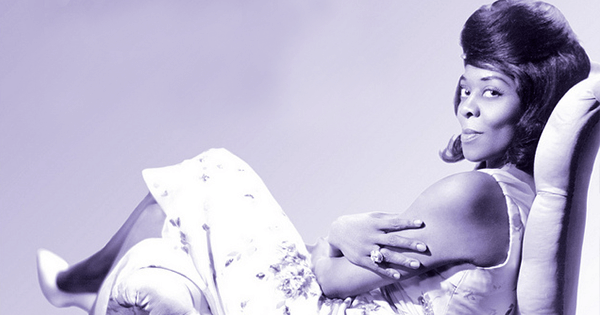
I am listening to Dinah Washington sing “Don’t Explain.” She is telling her man she knows he is cheating on her. Despite the lyric’s insistence that she still loves him and it doesn’t matter, her voice is harsh, bitter, weary. Disillusioned. She is basically saying: Don’t lie to me, save your breath, we both know what the score is. “What is there to gain? You’re my joy and pain. Is that lipstick? Oh no, don’t explain.” She’s the ultimate realist.
Her voice, often called gritty, gets down here, hits rock bottom. There’s nowhere further to go. Her voice is like paint remover or sandpaper stripping the walls. I want to find words to describe her voice, but it’s a hopeless proposition, especially with this song, because the whole point of it is—don’t explain. It’s the national anthem of anti-hermeneutics, the theme song to Susan Sontag’s “Against Interpretation.” She’s trying to communicate to her man about the exhaustion of communication.
In some of these late recordings, she approaches the tradition of the art song and the lied. Here, in “Don’t Explain,” despite the lush Ernie Wilkins arrangement conducted by Quincy Jones, she moves toward a stillness, a hush, and starts deconstructing the ballad lyrics, clawing them apart and looking inside. She reminds me of Edith Piaf, the way she acts out a song as much as singing it. She’s convincing us that she’s been around the block, that she has all the street cred you could ever want. And now she’s distilling all of her experience to bitter wisdom.
On the other hand, there’s another way of interpreting that “Hush now, don’t explain.” “Hush” is what you say when you’re trying to soothe a baby. So it’s possible to read in her voice a maternal quality: she knows her man is still just essentially a big boy and can’t help himself. The complexity of her response, simultaneously bitter and maternal, is what makes it so devastating.
It borders on heretical to say that I prefer Dinah’s version of “Don’t Explain” to Billie Holiday’s, but there it is. Don’t get me wrong, I appreciate that Billie is the greater artist. The history of jazz runs through Lady Day’s voice. All through my teens, 20s, 30s, and 40s, I listened constantly to Billie Holiday’s records, to the point that I knew every note, every phrase, not only hers but the great jazz musicians she played with, like Lester Young and Teddy Wilson. I listened to her so often that I could anticipate every time she sang behind the beat or slid just under the note, and now I can’t hear these records fresh anymore—I know them too well by heart. Then I started listening to Dinah. She came a little after Billie. She swung, she was definitely a jazz singer, she played with some great musicians (Clifford Brown, Ben Webster), but there wasn’t the same seamless conversation between her and her sidemen as there’d been between Billie and Lester. Whether Dinah sang with a jazz combo, a string accompaniment, or a big band didn’t matter: she was always alone.
Billie and Dinah both sounded like the Voice of Experience, but each came out of experience at different places. Billie sounded resigned yet bemused, as though she didn’t believe in love any more but there was still the possibility of hooking up for old time’s sake. She had that detached quality, whether it came from superior intelligence or booze and drugs, maybe both, a liquid sound, like floating lily pads. Dinah sounded as though experience had made her angry. There was a touch of gravel in her growl. As she aged, the voice didn’t deteriorate, it just got meaner.
I know I should revere Ella Fitzgerald. Her technique is flawless, but she always sounds so clear and cheerful—I can’t hear blues in her voice. I’m impressed by her but not in love—my fault, I realize. Sarah Vaughan, especially the young Sarah, “Sassy,” is irresistible, the perfect halfway-point between Ella and Dinah. But late Sarah sounds tired and mannered to me. Speaking of mannered, for a long time I resisted Nina Simone, who dragged out her phrases to an extremity of self-indulgence, often forgetting to swing. Or so I used to think, though lately I’ve been taken with her full-throated, idiosyncratic musicality and poetic lyrics. She too is in the art song tradition. As for Etta James, she’s like a kid sister next to these divas: she hollers, appealingly and well, but it’s a little one-note, limited.
Back to Dinah. She was born Ruth Lee Jones, and grew up in a gospel church world, from which she acquired vocal intensity. She went from jazz and salty blues to R & B to pop standards, even country and western, never compromising her passionate delivery, always sounding just like Dinah. According to Nadine Cohodas’s biography, Queen: The Life and Music of Dinah Washington, she lived a fast life, was rapacious in pouncing on those she fancied. Listening to her love songs, one gets the impression she did not confuse pleasure-taking with sentimentality. No candles and roses, just cut to the chase. But she was married seven times, which means she couldn’t have been so hard-bitten. She must have believed in the romantic dream at times, or maybe it was that maternal side of her that wanted to take care of someone. Her last husband was the football player Dick “Night Train” Lane, who woke to find her next to him, having died accidentally in her sleep at the too-young age of 39 from an overdose of pills and alcohol. Her dates are 1924–1963. I once thought of writing my own book about Dinah Washington, or at least a long article for American Heritage. The amount of research it would have required deterred me. Forgive me, Dinah, all you get is this blog.

